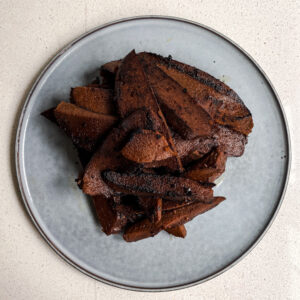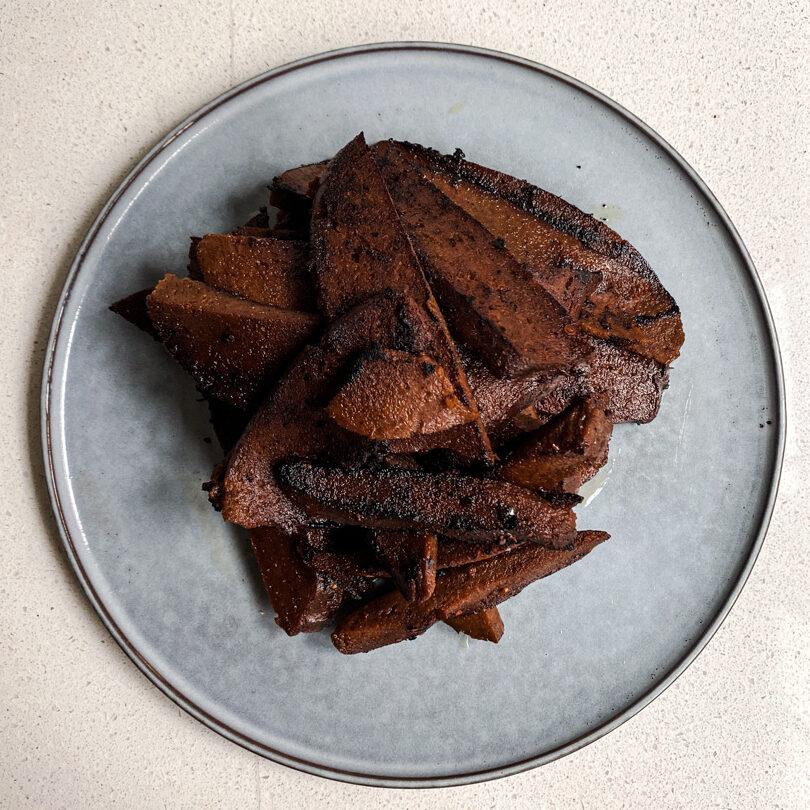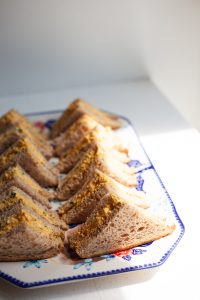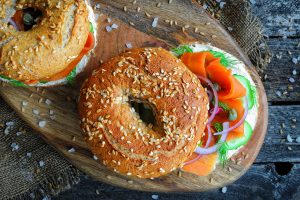Try this simple and tasty faux-beef recipe loaded with plant-based protein. It’s a fantastic vegan alternative to satisfy your meaty cravings. I love this meat substitute for various dishes, from Chinese Beef and Broccoli to Philly Cheesesteaks. Did I mention I love Philly Cheesesteaks?
So, what is seitan anyway?
Among the myriad plant-based protein sources, seitan stands out for its versatility and nutritional prowess. Also known as “wheat meat,” seitan packs protein and has a meaty chewy texture. One serving has over 43 grams of protein and only 225 calories, making it an excellent option for athletes and gym buffs.
Seitan is made by washing away the starch and fibre from wheat flour until you’re left with the high-protein gluten. You can make seitan by washing regular flour at home, but my preferred method is to purchase vital wheat gluten, which is ready to use – no washing required.
History of seitan
The origins of seitan can be traced back to China, where Buddhist monks and vegetarian communities first developed it during the 6th century. These early practitioners of vegetarianism sought a meat alternative that aligned with their values. Meat analogs like seitan are quite common throughout Asia, given the many cultures with a deep-rooted vegetarianism tradition, mainly influenced by religious practices such as Buddhism, Hinduism and Jainism.
Benefits of seitan
Protein, Protein, Protein: Seitan is a protein-packed superstar. It’s primarily made from vital wheat gluten, containing approximately 75-80% protein by weight. The high protein content makes it an excellent choice for those with high protein needs for supporting muscle growth, and maintaining overall health. Seitan contains all nine essential amino acids. However, it doesn’t contain much lysine, so that’s why I always incorporate other lysine-rich foods, such as legumes, into my seitan recipes.
Versatility Queen: One of seitan’s standout features is its remarkable versatility. It can be shaped and seasoned to mimic various meat textures and flavours, making it a go-to ingredient for many dishes.
It can imitate the chewiness of beef in a stir-fry, the tenderness of chicken in a sandwich and even the crumbly texture of ground meat.
Low in Fat, High in Nutrients: Seitan is naturally very low in fat, only 1g per serving. This makes it a heart-healthy option for those looking to reduce saturated fat intake. Additionally, it’s a good source of essential nutrients such as iron, calcium, and selenium.
Environmentally Friendly: Choosing seitan over traditional meat can have a significant positive impact on the environment, particularly when it comes to beef. The production of seitan requires fewer resources, including land and water, compared to raising livestock. Seitan generates fewer greenhouse gas emissions than cows, making it a more sustainable choice for eco-conscious consumers.
Kind of Allergen-Friendly: Seitan is free of soy or nuts, common allergens in plant-based diets. That makes it safe for school lunches or potlucks. That said, it’s not suitable for people with celiac or gluten sensitivity since the main ingredient is basically gluten!
How to prepare seitan
To make seitan, make a liquid base from a few key ingredients and spices, then add wheat gluten to form a dough. It’s a little like making bread, but you’ll steam it or boil it instead of baking it. Seitan dough is very porous and will absorb lots of water, so most recipes call for it to be wrapped in foil or cheesecloth. My favourite zero waste method is to use a reusable silicone bag like the Stasher brand. I’ve included cooking directions for two methods so you can work with what you have at home.

Hearty Seitan Beef from Scratch!
Ingredients
- 2 cups vegan beef broth sub vegetable broth
- 1 cup kidney beans approx. one small can, drained
- 1/4 cup tamari
- 2 tablespoons sesame seeds
- 2 tablespoons tomato paste
- 2 tablespoons shitake mushroom powder
- 2 tablespoons molasses
- 2 tablespoons vegetarian oyster sauce sub Worcestershire sauce
- 1 tablespoon onion powder
- 1.5 teaspoons garlic powder
- 1/2 teaspoon salt
- 3 to 3.5 cups vital wheat gluten
Instructions
- Add all ingredients except vital wheat gluten to a blender. Blend on high until the mixture is silky smooth.
- Add the liquid mixture to a large mixing bowl. Slowly mix in the vital wheat gluten, one cup at a time. After 3 cups, the mixture will form into a ball of dough.
- Begin to knead the dough gently. Add more vital wheat gluten if the dough is too soft and mushy. The final dough should be firm enough that if you poke it with a finger, it will bounce back slightly. 3 1/2 cups of vital wheat gluten is usually perfect, but the amount needed varies. Use your senses: it should be firm but not overly dry.
Cooking method 1: Boil in a heat-proof silicone bag.
- Bring a pot of water to a boil. Add the dough to a heat-proof silicone bag, like the Stasher brand. Add the bag to the pot of water and simmer on low heat for about 45 minutes. I typically line the bottom of the pot with a metal rack to prevent the bag from touching the bottom of the pot.
- Cooking in a silicone bag is my preferred method as no disposal products are required, and cooking time is faster.
- The dough is ready when it feels very firm to the touch.
Cooking method 2: Steam with foil
- If you don't have a silicone cooking bag, steaming with foil is a great alternative. Line the bottom of a pot with water. Insert a steam basket or rack in and bring to a boil.
- Separate the seitan dough into two large logs. Wrap each log with foil and place it into the steam basket. Steam for about 45 minutes to an hour. The dough is ready when it feels very firm to the touch.




